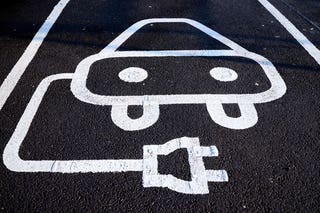[ad_1]

Germany wants to massively expand the country’s electric vehicle charging network, which will cost €6.3bn (£5.4bn) over the next three years.
The Berlin government expects more and more drivers to switch from internal combustion engine vehicles to more environmentally friendly vehicles.
The country’s transport minister presented a “master plan” to improve charging infrastructure, which was adopted earlier in the day by Prime Minister Olaf Scholz’s cabinet.
Volker Wissing told reporters in Berlin: “We are not just any car production site, but the world’s leading car production site. That is why it is important for us that our preparations are successful.
“We need to proactively expand a demand-friendly and user-friendly nationwide charging infrastructure.”

According to figures released by the German Federal Office for Motor Vehicles, the share of electric vehicles in Germany increased by 24.8% year-on-year to 14.6% of all newly registered cars.
The ministry said there are about 70,000 charging stations in the country, but only 11,000 of them are fast chargers.
This is not enough to adequately meet current demand, and as the number of electric vehicles rapidly grows, it will be even less.
There is also a big difference in the availability of charging points in large cities and rural areas, where charging stations are more difficult to find.
The German government aims to have 1 million public charging stations in the country by 2030.
To increase the number of charging stations, the federal government will provide real estate among other initiatives, especially along highways, where new charging stations can be built.
Private owners of electric vehicles will receive a subsidy program to install solar panels in their homes to charge their cars overnight.

Charging should also become more user-friendly, the minister said, with new digital offers showing drivers where they can charge their car on the road, or being able to check online how much different charging points are in demand.
Another issue the government wants to address as more people switch to electric vehicles is to prepare the country’s grid for the growing demand.
“We expect to see an exponential growth in the number of battery-electric vehicles registered over the next few years, so preparations must be made accordingly,” the minister said.
Shifting Germans from combustion engine cars to electric vehicles will play a key role in meeting the climate goals set by the government for the transport sector.
Regulatory pressure, tax breaks, improved battery range and the purchase of a wider range of vehicles are also driving the transition to electric vehicles.
Europe in general is leading the charge as electric vehicles enter the mainstream, with a commitment to phasing out internal combustion engine vehicles by 2035.
But the availability of charging points is an issue not only in Germany, but almost everywhere on the continent.
“Not only do most EU countries have an insufficient number of charging points on the road network, but the vast majority of them are not charging fast enough,” the European Automobile Manufacturers Association said.
Or, as the German minister put it: “Electric vehicles will only be accepted if charging is as easy as refueling today.”
[ad_2]
Source link